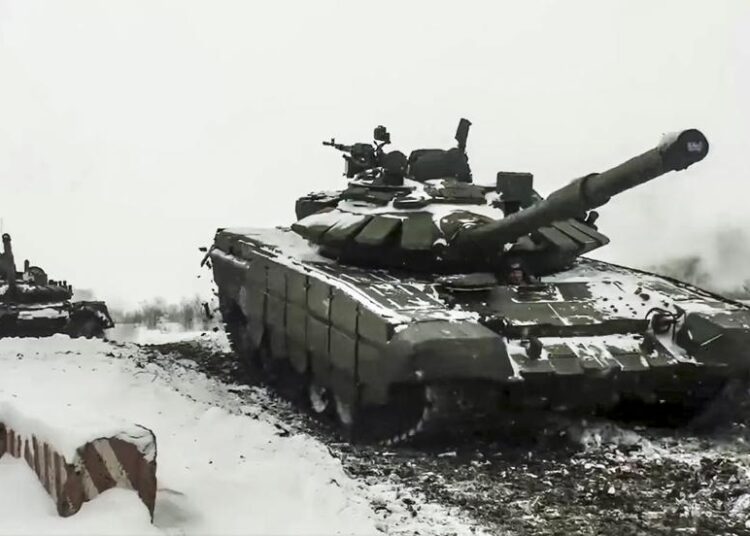MOSCOW — The US rejection of Russia’s main demands to resolve the crisis over Ukraine leaves little ground for optimism, the Kremlin spokesman said Thursday, while adding that dialogue was still possible, AP reported.
Tensions have soared in recent weeks, as the United States and its NATO allies expressed fear that a buildup of about 100,000 Russian troops near Ukraine signaled Moscow planned to invade its ex-Soviet neighbor. Russia denies having any such designs — and has laid out a series of demands it says will improve security in Europe
But as expected, the U.S. and the Western alliance firmly rejected any concessions on Moscow’s main points Wednesday, refusing to permanently ban Ukraine from joining NATO and saying allied deployments of troops and military equipment in Eastern Europe are nonnegotiable. The U.S. did outline areas in which some of Russia’s concerns might be addressed, possibly offering a path to de-escalation.
“There is no change, there will be no change,” U.S. Secretary of State Antony Blinken said, repeating the warning that any Russian incursion into Ukraine would be met with massive consequences and severe economic costs.
All eyes are now on how Russia will respond amid fears that Europe could again be plunged into war. That decision that rests squarely with President Vladimir Putin.
Kremlin spokesman Dmitry Peskov told reporters that the response from the U.S. — and a similar one from NATO — leaves “little ground for optimism.”
At the same time, he added that “there always are prospects for continuing a dialogue, it’s in the interests of both us and the Americans.”
Russian Foreign Minister Sergey Lavrov noted that the US response contains some elements that could lead to “the start of a serious talk on secondary issues” but emphasized that “the document contains no positive response on the main issue,” the Russian demands for the non-expansion of NATO and the non-deployment of weapons that may threaten Russia.
Amid the fears of Russian invasion in Ukraine, a top Putin associate alleged the country has become a Western tool to contain Russia.
“Ukraine has become a toy in the hands of NATO and, primarily, the United States, which are using it as an instrument of geopolitical pressure against Russia,” Dmitry Medvedev, a deputy head of Russia’s Security Council, said in an interview with Russian media.
Medvedev argued that Moscow sees no point in talking to Ukrainian President Volodymyr Zelenskyy, but voiced hope that the Ukrainians would eventually become “weary of that bedlam and elect the leadership that would pursue policies … aimed at normal economic relations with Russia.”
Medvedev’s comment follows a British claim that the Kremlin is seeking to replace Ukraine’s government with a pro-Moscow administration — an allegation Russia denied.
In 2014, following the ouster of a Kremlin-friendly president in Kyiv, Moscow annexed Ukraine’s Crimean Peninsula and threw its weight behind a separatist insurgency in the country’s eastern industrial heartland. Fighting between Ukrainian forces and Russia-backed rebels has killed over 14,000 people, and efforts to reach a settlement have stalled.
While a senior Russian diplomat has pointedly refused to rule out military deployments to Cuba and Venezuela, Medvedev expressed skepticism about such prospect.
“Cuba and Venezuela are aiming to come out of isolation and restore normal relations with the US to a certain extent, so there can’t be any talk about setting up a base there as it happened during the Soviet times,” he said.






Discussion about this post